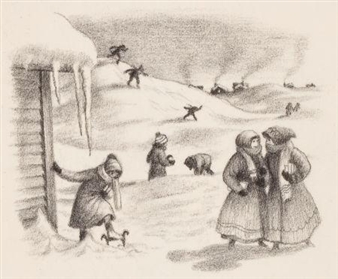One thing we're pretty sure of is that "blizzard" is an American, not English, word. And, we're not certain, but it may be onomatopoetic (favorite word of newby English students), which just means that the word sounds like what it describes. So a bee makes a buzzing sound as it flies from flower to flower, and a blizzard makes a "blizzing" sound as high winds and snows lash the prairie.
A blizzard, as defined by the National Weather Service, is "a severe snowstorm characterized by strong winds causing blowing snow that results in low visibilities," or, as I would amend it, "low visibility," and helpfully adds: "The difference between a blizzard and a snowstorm is the strength of the wind, not the amount of snow."
Now, in my opinion, this definition could be clearer. "Blizzard" is defined as a "severe snowstorm," but, if you look up "snowstorm"in the National Weather Service Glossary, that word is not listed at all. A dead end. The kind of dead end a word nerd hates most of all.
At any rate, the Oxford English Dictionary claims that, although the word had appeared in print earlier from time to time, "blizzard" came into currency in the Dakota Territory during the winter of 1880-1881. O. C. Bates, of the Estherville, Iowa, Northern Vindicator newspaper, used the word "blizzard" on 23 April 1870 to describe the harsh snowstorms of that fall and winter.
Now we hit the jackpot. The winter of 1880-1881 is the long winter described by Laura Ingalls Wilder in her book of the same name, written in the 1930s and published in 1940. She uses the word "blizzard."
At the Big Slough on his farm, Pa observes that the muskrats have built the walls of their den extra thick and, soon after, at the general store in town, he encounters a Native American (or "Indian," as Pa calls him) who has come into town to warn the settlers of the impending harsh winter.
Pa decides to move his family into town, and it's a good thing, too. According to information in the National Archives, Eliza Jane Wilder moved to the town with her family, including her younger brother, Almanzo, who would become Laura's husband, and she reported that many families froze to death that winter.
One of Garth Williams's illustrations from the Long Winter.

No comments:
Post a Comment